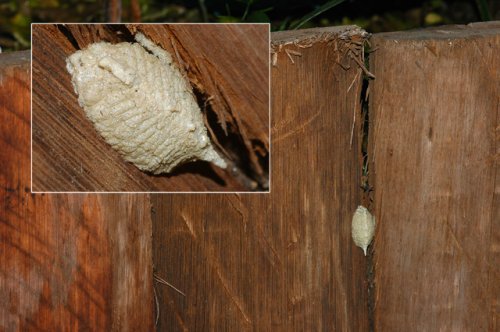Tygerr
Avid Member
Towards the end of May, I spotted a female mantis in my garden. I watched her for a while, and to my surprise she laid an ootheca right in front of me.
I should have taken some pics of her then, but I'm pretty sure she was a Common Green African Mantis (Sphodromantis gastrica).
I have a few questions now:
1) Do they lay more than one ootheca in their lifetime? How long do the adult mantids normally live?
(I promptly fed the mantis off to my cham after she laid the ootheca - I'm wondering if I should have left her to produce more)
2) I've read on the 'net that in generally, mantis babies usually emerge from the ootheca in about 2-4 weeks. It's been about 7 weeks now - I've been keeping an eye on it ever since she laid it, but haven't seen anything yet.
I know that they sometimes lay infertile oothecas, but it is winter now, and temps have been relatively cold (for here). Do they perhaps take longer to 'incubate' over winter periods? (I'm assuming the 2-4 weeks quoted are at ideal temps in captivity).
How can I tell if the ootheca is fertile or not, and whether the eggs are still in there.
3) How hard is it to raise/breed mantids? I know a few of you do it. Do you feed them fruit flies? Apparently this species feeds almost exclusively on caterpillars. I was thinking of using baby silkies as food.
Got any links to some good caresheets?
I've done a bit of searching on the internet
I've attached a photo of the ootheca, which still remains in my garden.
I should have taken some pics of her then, but I'm pretty sure she was a Common Green African Mantis (Sphodromantis gastrica).
I have a few questions now:
1) Do they lay more than one ootheca in their lifetime? How long do the adult mantids normally live?
(I promptly fed the mantis off to my cham after she laid the ootheca - I'm wondering if I should have left her to produce more)
2) I've read on the 'net that in generally, mantis babies usually emerge from the ootheca in about 2-4 weeks. It's been about 7 weeks now - I've been keeping an eye on it ever since she laid it, but haven't seen anything yet.
I know that they sometimes lay infertile oothecas, but it is winter now, and temps have been relatively cold (for here). Do they perhaps take longer to 'incubate' over winter periods? (I'm assuming the 2-4 weeks quoted are at ideal temps in captivity).
How can I tell if the ootheca is fertile or not, and whether the eggs are still in there.
3) How hard is it to raise/breed mantids? I know a few of you do it. Do you feed them fruit flies? Apparently this species feeds almost exclusively on caterpillars. I was thinking of using baby silkies as food.
Got any links to some good caresheets?
I've done a bit of searching on the internet
I've attached a photo of the ootheca, which still remains in my garden.

